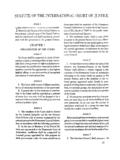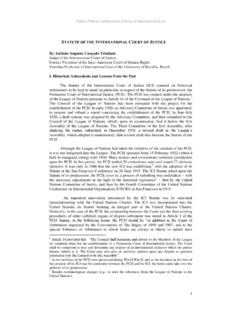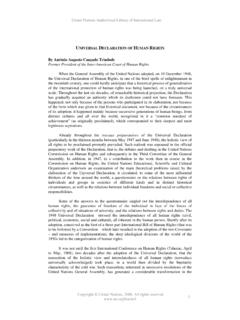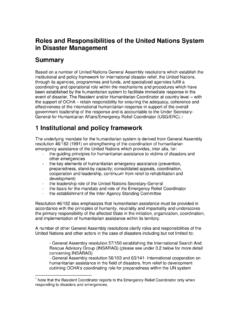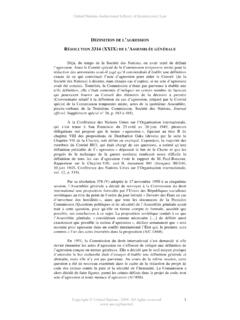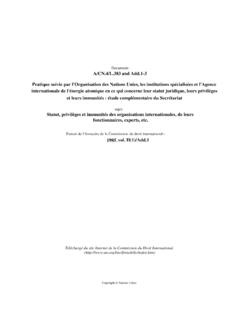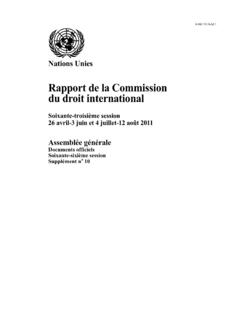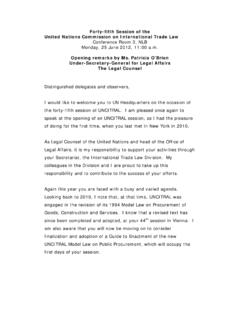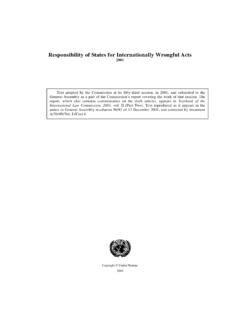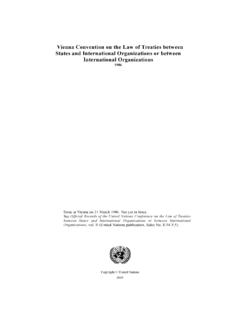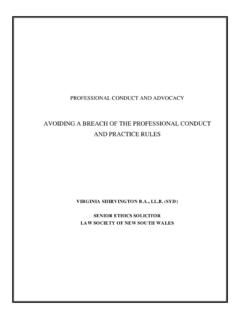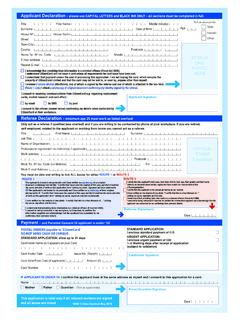Transcription of INTERNATIONAL LAW AND THE USE OF FORCE: WHAT …
1 INTERNATIONAL LAW AND THE USE OF FORCE: WHATHAPPENS IN PRACTICE?1 MICHAEL WOOD*I. INTRODUCTIONKofi Annan, Secretary-General of the United Nations at the time of the 2003 Iraq conflict, has written: No principle of the Charter is more important than the principle of thenon-use of force as embodied in Article 2, paragraph 4 .. Secretaries-General confront many challenges in the course of their tenures but thechallenge that tests them and defines them inevitably involves the use offorce. 2 The same might be said of Government leaders and their legal aim of this article is to give some flavour of the role that the internationallaw on the use of force plays in practice when a Government is contemplating theuse of force internationally, or aiding or assisting others to do so, or even just beingpressed for a view on what others are about to do or have done.
2 *Barrister, 20 Essex Street; Member of the INTERNATIONAL Law Commission; Senior Fellowof the Lauterpacht Centre for INTERNATIONAL article is based upon a lecture given at the Indian Society of INTERNATIONAL Law on 13 September 2013. It draws upon and updates earlier talks and writings, including M. Wood, Towards New Circumstances in which the Use of Force may be Authorized? The Cases ofHumanitarian Intervention, Counter-terrorism and Weapons of Mass Destruction , in , N. Schrijver (eds.), The Security Council and the Use of Force: Theory and Reality A Need for Change?
3 (2005), pp. 75-90; M. Wood, The Law on the Use of Force: CurrentChallenges , Singapore Year Book of INTERNATIONAL Law, vol. 11 (2007), pp. 1-14; M. Wood, Terrorism and the INTERNATIONAL Law on the Use of Force, in B. Saul (ed.), ResearchHandbook on INTERNATIONAL Law and Terrorism (2014), Zacklin, The United Nations Secretariat and the Use of Force in a Unipolar World:Power v. Principle (2010), pp. recent political memoirs deal directly with the INTERNATIONAL law on the use of force bythe UK Government. John Morris, Lord Morris of Aberavon, Prime Minister Blair s firstAttorney General, has written a memoir entitled Fifty Years in Politics and the Law(University of Wales Press, 2011), which contains a frank chapter about the 1999 Kosovointervention.
4 Foreign Minister Straw s autobiography, Last Man Standing. Memoirs of aPolitical Survivor (2012), has a chapter on the 2003 Iraq conflict, which begins with thestatement, I could have prevented the United Kingdom s involvement in the Iraq war. Idid not do so. I chose to support the war. Here s why. INDIAN JOURNAL OF INTERNATIONAL LAW[VOL. 53346 There are at least five practical points that concern government lawyers, butwhich are not often discussed by INTERNATIONAL lawyers more First, thedistinction between the rules of public INTERNATIONAL law on the use of force and theconventions or rules of constitutional law concerning when a Government maydeploy the State s armed forces or otherwise become involved in a conflict many States, though perhaps not until relatively recently for the United Kingdom.]
5 The crucial legal issues often arise in the context of constitutional law and practice,rather than public INTERNATIONAL law as In some States, to the extent that it isconsidered at all, INTERNATIONAL law seems to play an indirect role. Thus, for Germanyand for Japan, the key issues are the limits on the use of force set out in theirconstitutions, which may or may not correspond to INTERNATIONAL law, including therole of the legislature in authorizing the deployment of armed forces outside thenational territory. For Ireland, for Switzerland, and some other States, a key issuewill be the conformity of any action (such as allowing overflight or refueling) withconstitutional or other commitments to neutrality.
6 This is so even in the UnitedStates. Domestic war powers issues the respective roles of the Commander-in-Chief and the Congress - loom large. For example, in September 2013, accordingto the US press, there was an oral opinion given by the US Justice Department tothe White House that the President would be acting lawfully if he attacked Syriaeven without Congressional support, but that focused on law not internationallaw (and in any event was overtaken by the President s request for Congressionalsupport).Of course, domestic law concerns are by no means absent in the UK.
7 Whatshould the role of the courts be in relation to the use of force? In the CND case inlate 2002, prior to the invasion of Iraq in March 2003, the Court of Appeal wasasked to interpret Security Council resolution 1441(2002) and the United NationsCharter, but declined to do What should the role of Parliament be? The Blairand Brown Governments engaged in a wide consultation on this and otherconstitutional issues. They seemed to have decided against legislation, but mayhave been planning to proceed by way of a Parliamentary resolution that wouldhave introduced a presumption that Parliament would be consulted before the UKwent to war (as had indeed happened before the Iraq conflict in 2003).
8 The matterresurfaced under the Coalition Government at the time of the action over Libya in have discussed some of these in The Role of INTERNATIONAL Lawyers in Government , inD. Feldman, Law in Politics, Politics in Law (Hart, 2014), pp. Ku and H. K. Jacobson (eds.), Democratic Accountability and the Use of Force inInternational Law (2003).6R (On the Application of Campaign for Nuclear Disarmament) v. Prime Minister [2002]EWHC 2777 (Admin), [2003] ACD ]347 INTERNATIONAL LAW AND THE USE OF FORCEThe Cabinet Manual (the first edition of which was published in October 2011)7states the following: Military Since the Second World War, the Government has notified the Houseof Commons of significant military action, either before or after the event,by means of a statement and has in some cases followed this with a debateon a motion for the adjournment of the House.
9 [Footnote reading: Examplesbefore the Iraq debates of 2002 and 2003 include Afghanistan (4 and 8 October 2001); Kosovo (24 March 1999); and the Gulf War (17 and 21 January 1991)]. In the two most recent examples of significant military action, in Iraqand Libya, Parliament has been given the opportunity for a substantive took place in Parliament shortly before military action in Iraq beganin 2003. In relation to Libya, the Prime Minister made a statement in theHouse of Commons on 18 March 2011 in advance of military action, whichwas followed by a government motion for debate on 21 March, expressed interms that the House supports Her Majesty s Government [.]
10 ] in the takingof all necessary measures to protect civilians and civilian-populated areas .[Footnote reading: The full text of the motion is at Hansard, HC cd. 700 (21 March 2011).] In 2011, the Government acknowledged [Footnote reading: Leader ofthe House of Commons, Hansard, HC col. 1066 (10 March 2011).] that aconvention had developed in Parliament that before troops were committedthe House of Commons should have an opportunity to debate the matter andsaid that it proposed to observe that convention except when there was anemergency and such action would not be appropriate.
